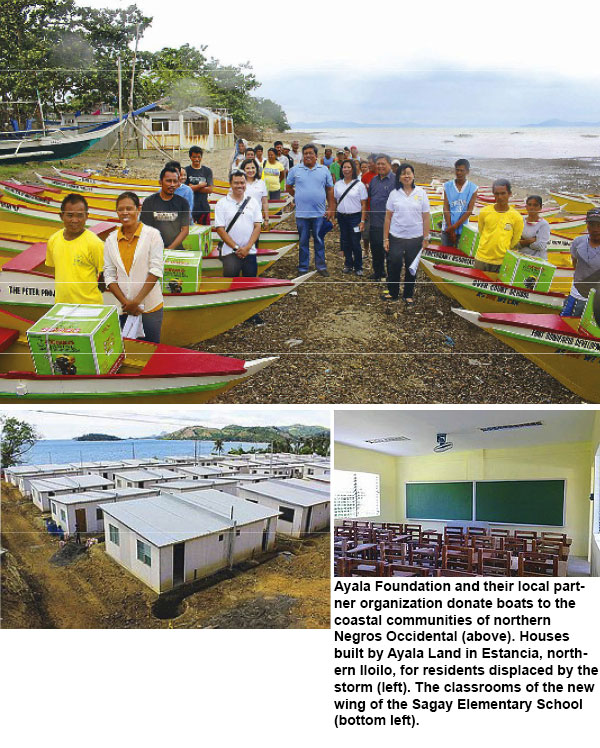Partners in the business of life
MANILA, Philippines - We had never seen anything like it.
That was the consensus after Super Typhoon Yolanda, unprecedented in its destruction in a country frequented by an average of 20 strong typhoons annually.
“Marami na kaming naranasang bagyo pero ngayon lang nasira ang iskwelahan (We’ve gone through many storms but only now was the school destroyed),” said Marlon Sayde, a teacher at the Guiuan National High School in Eastern Samar.
Guiuan, the municipality where Yolanda first made landfall, bore the fullest brunt of the storm, considered one of the strongest ever recorded. In a matter of hours, much of the Visayas was no less spared.
The response, no matter the magnitude of the devastation, was urgent and massive. Yolanda brought out of everyone a strong singular need to help, no matter who or where they were in the world. Aid poured in from countries, organizations and companies. Ordinary citizens reached out with food and clothing drives, provided shelter to affected families and helped them find relatives in the city, and volunteered at relief operations.
Indeed, we had never seen anything like Yolanda. But one of the clearest lessons the experience brought home is the necessity of collective response from the private, public and development sectors to make the relief and rehabilitation effective.
No longer business as usual
Tropical cyclones of such magnitude as Yolanda’s may soon be the new normal, according to climate change researchers. Given the impacts we have seen, especially for an archipelagic country like the Philippines, the prospect is alarming.
That business has a significant role is, similarly, becoming the new normal. Over the last decade, capitalism has gone under closer scrutiny. All over the world, companies are now expected to create not only wealth and jobs but better and shared value for the communities where they operate. Business legitimacy has come to rest on these contributions to sustainable development.
In times of disasters most especially, the private sector has proven to be the government’s crucial partner. With its resources, project management expertise and a bias for action and results, business is certainly in a strong position to help.
Aware of the massive rehabilitation and development required by the communities ravaged by Yolanda, the Ayala group of companies has used its reach and expertise as a conglomerate to deliver significant support and assistance.
Ayala along with its partners raised and allocated substantial funds for education, shelter and livelihood programs in various affected areas, particularly in Leyte, Samar, Iloilo, Aklan, Capiz, Antique, northern Negros and Palawan.
The bulk of the more than P400-million allotment – with contributions from the conglomerate’s operating units, partner institutions, employees and individual donors – went to immediate relief efforts, including initiatives that addressed the health and medical needs of the survivors. The rest of it is being used to rebuild homes, classrooms and fishing boats, rehabilitate destroyed farms, and provide support for small start-up businesses to help the most stricken get back on their feet. To this day, Ayala subsidiaries Ayala Land (Alay sa Visayas), Globe (Project Wonderful), Bank of the Philippine Islands, Manila Water (Baso Water and Mobile Treatment Plant) and Ayala Foundation (Laging Handa) continue to implement programs on the ground, serving as channels of the entire group.
Journeying towards resilience
Communities affected by Yolanda are themselves working towards a new normal one year later. Some families have started to pick up the pieces with new sources of livelihood and more durable houses, and many children have also begun to return to school – the makeshift tents making way for better-built and equipped classrooms.
Still, much remains to be done, but a year after Yolanda, Ayala’s continued presence in the affected communities through the educational, livelihood and housing programs of its subsidiaries now focus on building resilience.
Building resilience is a process that requires cooperation and coordination to allow an organization or community to bounce back after shocks and stresses. Ayala, as a conglomerate, uses a holistic approach and harnesses the strengths of its subsidiaries to develop the various aspects of resilience in partner communities.
Because most of the affected are from coastal communities that rely on the sea for their living, boats were built and donated. Made of sturdier materials such as fiberglass, the vessels help fisherfolk go into deeper waters and catch larger fish. Others received training in fish processing to provide another source of income. Further inland, farms are also being rehabilitated through the distribution of seeds, fertilizers, other farming supplies and small equipment.
Homes ranging from 21 sq. m. to 32 sq. m. have been constructed in areas close to school buildings and livelihood opportunities. To allow the communities to take advantage of the construction boom, many residents were trained in carpentry and the making of hollow blocks. Some have become distributors/selling agents of Globe products to augment household incomes. Pedicabs were also donated and sari-sari stores turned over to jumpstart the local economy and provide much-needed mobility options.
Throughout Ayala’s assistance, partners and volunteer employees assist in the programs guided by good community development practices to promote long-term positive impacts rather than short-term solutions.
As the oldest business house in the Philippines at 180 years and with the nationwide reach of its investments, Ayala understands the extent of the good it can contribute to help push sustainable Philippine development.
For almost two centuries, Ayala has tied its business success to the thrust of building the nation and, recently, has made sustainable development integral to its operations.
Known for pioneering business sustainability in the country, Ayala places equal emphasis in the triple bottom line of profit, planet and people. Believing that business cannot be truly successful independent of a healthy environment and resilient surrounding communities, it leads in the early adoption of the “new normals” brought by an inevitably changing world.
- Latest
- Trending













